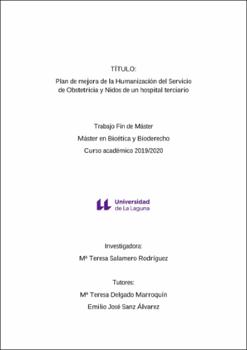Plan de mejora de la humanización del Servicio de Obstetricia y Nidos de un hospital terciario
Fecha
2021Resumen
Introducción: Una de las áreas de estudio de la bioética en su vertiente práctica se basa
en el análisis de la calidad de la atención que se presta a los pacientes, tanto en el respeto
a su dignidad e intimidad como en la confidencialidad y privacidad. La calidad de esta
atención se manifiesta igualmente en la forma de cuidar a la paciente velando siempre por
su confort físicosociocultural, psicoespiritual y ambiental, tal y como defiende la teoría
de Kolcaba.
Objetivos: 1. Analizar la calidad de la atención prestada a las pacientes, tanto en el
respeto a su dignidad e intimidad como en la confidencialidad y privacidad. 2. Elaborar
unas medidas de mejora de la Humanización del Servicio.
Métodos: Se llevó a cabo un estudio descriptivo transversal mediante un cuestionario
adaptado de Virginia Henderson, autocumplimentado y de respuesta anónima, al personal
del Servicio (médicos, enfermeras, Técnicos en Cuidados Auxiliares de Enfermería y
matronas) de Obstetricia y Nidos del Hospital Clínico Lozano Blesa. El análisis de los
resultados obtenidos en el estudio descriptivo permitió elaborar una serie de
recomendaciones del plan de mejora de la Humanización.
Resultados: Se detectaron los puntos fuertes y de mejora del Servicio y se elaboraron
una serie de medidas correctoras que contribuyen a humanizar la asistencia: Cuidar la
identificación, presentándose a la paciente; evitar conversaciones no concernientes ante
las pacientes; evitar el empleo de una jerga profesional ininteligible para las pacientes;
velar por el cuidado de la intimidad de la paciente; explicar las pruebas o tratamientos
que se van a realizar a la paciente, y presentarles a los estudiantes o residentes.
Conclusiones: El trabajo objeto de estudio permitió concretar las fortalezas y puntos de
mejora para garantizar la humanización y el respeto a la dignidad de las personas
ingresadas. ABSTRACT
Introduction: One of the areas of study of the practical aspect of bioethics is based on
the analysis of the quality of care provided to patients, both in respect for their dignity
and intimacy, as well as their confidentiality and privacy. The quality of this care is also
manifested in the manner of caring for the patient, always ensuring her physical,
sociocultural, psychospiritual and environmental comfort, as defended by Kolcaba's
theory.
Objectives: 1.To analyze the quality of care provided to patients, both with respect for
their dignity and intimacy, as well as confidentiality and privacy. 2. To develop measures
to improve the humanization of the service.
Methods: A descriptive cross-sectional study was carried out using a questionnaire
adapted from Virginia Henderson, self-completed with an anonymous response to the
staff of the Obstetrics and Nursing Service (doctors, nurses, Nursing Assistant
Technicians and midwives) of the Lozano Blesa Clinical Hospital. The analysis of the
results obtained in the descriptive study allowed the elaboration of a series of
recommendations of the plan to improve humanization.
Results: The strengths and improvement points of the service were detected and a series
of corrective measures were developed that contribute to humanizing care: caring for
identification, introducing oneself to the patient; avoiding conversations not concerning
to patients; avoiding the use of jargon unintelligible to patients; ensuring care for the
patient's privacy is taken; explaining the tests or treatments to be performed to the patient
and introducing them to the students or residents.
Conclusions: The work under study made it possible to specify the strengths and points
for improvement to guarantee humanization and respect for the dignity of those admitted.





